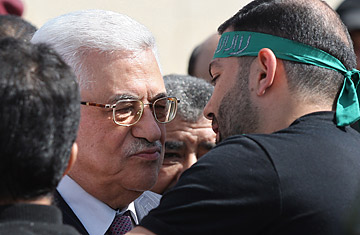
Palestinian President Mahmoud Abbas greets a prisoner wearing a Hamas headband in Ramallah after Israel released hundreds of Palestinian prisoners on Oct. 18, 2011
As Palestinians exult in the release of 477 prisoners from Israeli jails and anticipate the arrival of the 550 more due to be freed in December under the terms of the bargain Hamas brokered for Israeli soldier Gilad Shalit, Palestinian Authority President Mahmoud Abbas is pushing Israel to release even more, citing what he terms a secret promise from a previous Prime Minister.
Abbas tells TIME in an interview that the promise was made by Ehud Olmert, who preceded Benjamin Netanyahu as Prime Minister and spent months negotiating the details of a potential peace deal with Abbas before being forced from office three years ago. Abbas says the subject of prisoners came up after Olmert twice arranged the release of several hundred prisoners as a goodwill gesture in advance of peace talks. "And after that I asked him to release some big number," Abbas says. (Press reports at the time mentioned 2,000.) "He said, 'Now I cannot because we have a Shalit deal, but I promise you when we conclude Shalit and everything is O.K., I will give you, not the same number, not the same quality, more.' I think that he repeated it twice in different meetings."
"But," Abbas adds, "he asked me, 'Please keep it secret, confidential between us because we don't want to affect the deal with Shalit.' I said, 'O.K., O.K., I will keep it.' Now the deal is over, and we will ask them to fulfill their promises." Olmert's negotiations for Shalit's release fell through, but Abbas wants Netanyahu to keep his predecessor's promise.
In an effort to nudge the process along, Abbas says he laid out the offer to the Obama Administration on Wednesday, informing U.S. diplomat Daniel Rubinstein of the details during a meeting in Ramallah. As U.S. consul general in Jerusalem, Rubinstein is the primary point of contact for Palestinian officials. Abbas says he is also one of two American diplomats who broached the possibility of prisoner releases as a "confidence building" measure Washington was offering to spark the resumption of peace talks.
"The American envoy David Hall, and the counsel general, Daniel Rubinstein, came six or seven months [ago] telling me that President Obama is willing to give you a confidence-building measure to be fulfilled by Netanyahu," Abbas says. "I said, 'What kind of confidence-building measures?' They said to help Gaza, to alleviate the siege around Gaza, to remove some of the roadblocks, to help you in the C area [portions of the West Bank entirely under Israeli control] and to release prisoners."
"What was my answer? No. Why? Because I knew the Israelis will put it on the table and start to negotiate it instead of the final status issues. But after that, they returned back two or three times saying, 'Please, this is our offer. You have to appreciate it, you have to accept, because you don't have to do anything. It is free of charge. It will not cost you anything.' After the third time, I said, 'O.K., let us start.' Of course they didn't start, nothing happened."
Neither the American diplomats nor Olmert could be reached Wednesday night, the start of a religious holiday in Jerusalem. But Abbas' account illustrates the potency of the prisoner issue with the Palestinian public. The Shalit deal gave an immediate political boost to Hamas, the Islamist rival of the secular Fatah party Abbas leads. It was a deft political move that changed the subject, at least for a time, from admiration for Abbas' Sept. 23 speech requesting Palestinian statehood at the U.N. On Tuesday, both the Gaza Strip, which the Islamist party controls, and Ramallah, a solidly Fatah city, were awash in the green flags of Hamas.
"Why not?" Abbas says. "They are celebrating a very big victory — granted by our neighbor." The neighbor is Israel, and the jab betrays his irritation that the Shalit deal boosted Hamas, whose charter calls for Israel's destruction, at the relative expense of Abbas' Palestinian Authority, the body committed to reaching a negotiated end to the conflict and the four-decade occupation of Palestinian territory by Israel's troops. Abbas, in fact, goes on to say he's skeptical that Netanyahu will honor his predecessor's vow on prisoners — the leader of the conservative Likud Party has already declined to accept the positions Olmert negotiated during months of secret peace negotiations with Abbas.
"Of course I doubt that Netanyahu will do it," Abbas says, seated on a couch in his heavily guarded apartment in northern Ramallah. He shrugs. "But I will send to him a message within two or three days to ask him whether he will accept or not. I'm not going to argue with him or not negotiate with him or to talk in detail about it. Either, or. If he doesn't believe us, he can ask Mr. Olmert. He can turn back to the minutes, protocols — everything is in writing. Of course he didn't give us it in writing, but of course his colleagues write everything."
